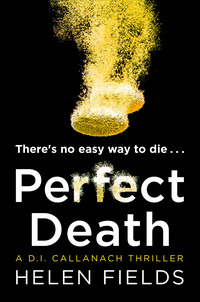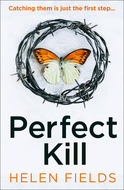Kitap dosya olarak indirilemez ancak uygulamamız üzerinden veya online olarak web sitemizden okunabilir.
Kitabı oku: «A DI Callanach Thriller», sayfa 2
Chapter Four
Out at Gipsy Brae recreation ground, north of the city, the wind sliced sideways. It carried away voices and notebooks, whipping hair and leaving the landscape stark. The road had been cordoned off before the entrance to the park. Ava sat in her parked car, delaying the walk to where Begbie’s vehicle was lit up in the distance. The recently retired Detective Chief Inspector George Begbie had been a policeman’s policeman. Crabby at times, long-suffering, straight to the point and a champion of victims. In all the years Ava had worked with him, she never once saw him lose sight of what mattered. Somewhere at the heart of every case, someone had been hurt or had lost something. The Chief had fought for those people with all his considerable might, ignoring the brass bearing down from above, paying no attention to the press, oblivious to the politicians. He’d been as sharp as a pin and never expected a single officer to work more hours than he himself put in.
It was Begbie who had saved Ava from the misogyny that might have cost her a career as a detective, giving her a post on the Major Investigation Team, promoting her against more obvious candidates, even suspending her not long ago while her name was cleared regarding a breach of protocol. She knew it had hurt him to do that. They had evolved from colleagues to firm friends over late nights at crime scenes and early mornings when they were short-staffed. Even as a junior officer, Begbie had never excluded her from meetings, seeing her potential. If the rest of the squad liked and admired him, Ava had loved him like a favourite uncle. One who had occasionally shouted at her and made her work three days straight without sleep but, nonetheless, he was most of the reason she’d stuck with a career in policing. She didn’t want to believe he was gone.
Ava locked her car and went on foot, wondering why George Begbie, who favoured warm pubs and comfy chairs, had chosen this barren place to say his final goodbye to the world. Staring out across the North Sea with Cramond Island to his left, Granton Harbour on the right, and nothing but vast grey skies reflected on icy water, it was a horribly bleak ending for such an oversized personality.
Ava hung back at the top of the small road that led down to the sea allowing access for caravans and maintenance trucks, now also to Begbie’s ancient Land Rover. He had parked it away from the footpaths, facing the waves. No one would voluntarily have gone close to a lone male sitting in a vehicle, especially such an intimidatingly large figure. Ava put on a white suit, shoe covers and gloves, for what little good it would do. A determination of suicide had already been made, subject to autopsy. A snake of piping had been disconnected from the car window and lay still on the grass, malevolent even now. Tenting had been erected to protect the scene – more from prying eyes than to preserve evidence – and the busy silhouettes of Scenes of Crime Officers were bustling.
Walking down the gentle grass slope, hands in pockets, Ava was mindful that the light had gone from the day and soon a full lighting rig would be required to process the scene. A young Sergeant, his uniform immaculate, face a picture of concern, walked towards her.
‘Do you have your ID on you, please?’ he said.
Ava handed it over, too tired to explain who she was.
‘Major Investigation Team?’ the officer asked. ‘I’d hardly have thought this was your territory.’
‘Sergeant, if you’ve finished telling a Detective Chief Inspector where she should be and what she should be doing, perhaps you could chase that dog walker over there off this grass. And you address me as ma’am or DCI. Now get going.’
‘Yes, ma’am,’ he said, pulling his coat up around his neck and heading off into the wind.
Ava took a deep breath. She hated rudeness, particularly the brand that grew from superiority. If Begbie had taught her nothing else in all the years he’d been her commanding officer, it was that rank came with a responsibility to be kind and to listen. She reined in her emotions.
‘Where’s Dr Lambert?’ Ava asked a passing Scenes of Crime Officer.
‘Busy elsewhere,’ the officer said, stepping around Ava to take a new pair of plastic gloves from a box. Ava took her by the arm.
‘She’s busy? The deceased is a former Detective Chief Inspector. He spent twenty years attending crimes scenes like this and now he’s not a priority? I want to know what happened here. There’s no way George Begbie committed suicide.’
The officer clenched her jaw, pulled her arm out of Ava’s grasp and took a step away.
‘A minibus skidded on a patch of ice and left the road half an hour ago, carrying eight children. Two of those are fatalities. Dr Lambert is making that the priority. If you’ll excuse me.’
‘I hadn’t heard,’ Ava said to the Scenes of Crime Officer’s back. ‘I’m sorry.’
‘DCI Turner?’ a voice said from behind her. A man stepped in offering his hand as the SOCO retreated. ‘I’m Chief Inspector Dimitri. Never had the pleasure of working with George Begbie but I understand he was well respected by his men. Why don’t we let forensics do their bit? I always feel like a spare part while they’re processing. We could wait in my car if you like.’
‘That won’t be necessary but I appreciate the offer,’ Ava said. ‘I’d like to see the body in situ, though. I take it this is your patch.’
‘I was assigned to deal with it, although it seems unlikely to be an ongoing police matter.’ He paused and looked towards Begbie’s car. ‘I’ve lost people I worked with and it’s hard. The trick is not to turn it into a crusade. As soon as you start overthinking it, you lead yourself in all the wrong directions. I’m not trying to put you off, but the best thing to do really would be to leave it to us. You can count on me to look after him, and any information you want, you only have to ask.’
Ava glanced at the Chief Inspector she’d heard of but never met in the flesh. He was so softly spoken that she’d found herself craning her neck forward to listen. Close-up, she realised his eyes were so pale a shade of blue that they were hard to look away from. His hair was white but not by virtue of his age. She guessed him to be in his mid-fifties although his face appeared sculpted from some organic material that didn’t age. Before she could respond to his suggestion, a stretcher appeared from the vicinity of the car with a body bag on it. It was carried to a waiting van for transportation to the city mortuary. Whatever assumptions had been made at the scene, there would still have to be an autopsy.
‘Let me walk you back to your car,’ Chief Inspector Dimitri said.
‘No need.’ Ava shook her head. ‘I’d like to inform George Begbie’s wife myself, if you don’t mind. I appreciate your officers will follow up and take a statement from her. But tonight … I know her. He’d have preferred it to come from a friend.’
‘I understand that,’ Dimitri said. ‘The facts, those few we have, are that a couple walking the coast path were aware of the sound of the engine, walked past to cut up to the road and noticed the hose running from the exhaust. They wrenched open a door – apparently the rear passenger side was unlocked – but by then it was too late. They called for an ambulance and police. The first responders asked for a plate check and that’s how we ID’d him. I’m afraid to say it all looks tragically standard, if you can think of it that way. There’s a bottle of whisky, empty, on the front passenger seat. The radio was playing. No signs of a struggle, broken windows or door locks.’
‘Thank you,’ Ava muttered. ‘I appreciate your kindness. My squad will be devastated. You’ll let me know what you conclude?’
‘Of course. He’s in good hands, I promise,’ Dimitri said.
Ava nodded, shoved her hands down deep into her pockets and walked away, pausing before climbing into her car to look back down towards the crashing sea, a force as destructive and brutal as the news she was about to deliver to George Begbie’s wife.
The Begbies’ house was out east of the city at Portobello, where St Mark’s Place met Argyle Crescent. A traditionally built home, with stone graduating from brown to black by years and precipitation, it stood out from its neighbours by virtue of the miniature turret rising at one side. Ava remembered the Chief joking about how his home was literally his castle, and it looked exactly like a tiny replica of one. He and his wife had loved the place, moving there a decade ago and as far as Ava knew they had been planning to remain there for the foreseeable future. A future that had been stopped firmly in its tracks. The house had been filled with warmth and laughter whenever Ava had visited in the past. This trip would mark the end of all that. It would never be the same again. Not for her, and certainly not for Glynis Begbie once Ava had delivered the dreadful news. She waited in her car a while as Mark Knopfler sang of jackals and ravens, half expecting Begbie’s wife-cum-widow to step out of her front door, a sixth sense leading her onto the street and into Ava’s path. She didn’t appear. Ava clicked off the radio, made sure her clothing was tidy, and walked the few steps up the front path to the door.
‘Ava! How lovely to see you, my darling. George didn’t warn me or I’d have baked. Honestly, that man. So distracted all the time …’
‘Glynis,’ Ava cut in. There was a second when she said nothing, that television moment as Ava always thought of it, where somehow just the physical presence of a police officer unexpectedly on the doorstep was all the omen required to trigger knowledge and grief. It didn’t come.
‘Come on in, quickly now. You’ll freeze out there. Probably just my age but I feel the cold all the time these days. Give me your coat. I’ll call George on his mobile and get him back. He’ll kick himself if he misses you.’
‘Glynis,’ Ava said again. ‘Let’s sit down.’ There it was. That fractional falter of her smile, the double blink before she responded.
‘Of course. Come into the lounge. Forgive the mess, I was just writing some cards. Are you sure you wouldn’t like a cup of something hot?’
Ava sat down on the sofa and waited until Glynis had perched on an armchair.
‘I’m sorry to have to bring you this news, but George has been found dead in his car. The initial indications are that it was suicide.’
Glynis’ mouth slackened, her brow drew in. There was a small shake of her head. Ava had seen it too many times, that moment of defiance, the refusal to accept the news of a death. She waited for Glynis to speak. It was always a question first. Where? When? How? Most often in a suicide: Why?
‘Something was wrong,’ Glynis said, her voice a thin tremor in the air.
Ava stared at her. ‘His heart again? Had his doctor given him bad news?’
Glynis shook her head. ‘Not that George told me. As far as I knew he was recovering well. But for the last couple of weeks he’s been, I don’t know, sullen. Not like him at all.’
‘I’m sorry to ask this, but did you suspect he might be a risk to himself? Had he talked about it?’ Ava asked.
‘No. No, I’d have told someone. Where is he now?’
‘On his way to the … he’s going to Ailsa Lambert’s office. She’ll take good care of him,’ Ava said.
‘It’s too late for that, isn’t it? His dinner’s in the oven. Plenty of green veg. Nothing high in fat or sugar. He hated it, the diet since his heart attack. Still, he always cleared his plate without complaint. Before, we used to have a cream cake every Friday, as a treat, you know. Hasn’t had one for six months. I think that was the thing he missed most.’
‘Glynis, let me make some calls for you. You should have your family here.’
‘I’d like to go and see George first if you don’t mind. There’ll be an autopsy if I’m not mistaken?’
‘Yes,’ Ava whispered.
‘How did he do it?’ Glynis asked, her mouth a tightly pressed trembling line across her face.
‘Car exhaust fumes,’ Ava said. Glynis tried to rise from the chair, wobbled, took her seat again. ‘Let me get you a glass of water. Don’t try to move.’ She walked to the kitchen and began opening cupboards to find a glass when feet shuffled in behind her.
‘Would he have suffered? I want the truth, Ava. I was married to a policeman for thirty-five years. There’s no point lying to me.’
Ava ran the cold tap to make sure the water was fresh as she thought how to answer the question. George Begbie’s wife was no fool, and the detail of the cases MIT handled wouldn’t have passed her by. Such was the baggage that came with marrying a police officer.
‘Headache, nausea. He’d have felt faint. Probably there’d have been a sense of panic if he was still conscious when his body recognised it was starved of oxygen. He may have had chest pains, especially given his medical history. Possibly some sort of seizure at the end,’ Ava said. ‘I’m so sorry. I wish …’
‘Please don’t,’ Glynis said. ‘I’ll take that water now.’
Ava handed her the glass and leaned back against the kitchen cupboards rubbing her temples.
‘You said something was wrong. Can you be any more specific?’ Ava asked.
‘There were a few late night phone calls. A couple to his mobile, at least one on the landline. He never told me who they were from. Made a joke about it to distract me. Then a package was left on our doorstep once when we were out shopping. No label. I told him he should call the police. He knew he was still a target given the number of people he’d put inside. He took the package to his shed, told me it was some rubbishy free samples. I always knew when he was lying.’
‘And you think whatever it was might have been enough reason for him to have …?’ Ava broke off.
‘George hated suicides. Said it was the cruellest thing to do to another human being. If you’re right and that’s what he did, then I have no idea who the man was I’ve been living with for more than half my life. I’d like to go and see him now please.’
* * *
They arrived at Edinburgh City Mortuary half an hour later. Dr Ailsa Lambert met them at the door, greeting Glynis with a hug. Ailsa held back her own tears as she showed them into the autopsy suite. There was a body beneath a sheet on a steel table.
‘I’m sorry I can’t offer anything more appropriate than this room. Everywhere else is in use. Are you sure you’re ready to do this, Glynis? I can formally identify him. You don’t need to make this your last memory of George,’ Ailsa said.
‘I need to,’ Glynis replied, crushing a handkerchief in her hand and staring at the concealed bulk of the man she had loved for decades.
Ailsa pulled back the sheet to reveal naked head and shoulders. There was an intake of breath from Glynis. Ava reached out an arm to put around her shoulders, tempted to look away but there was no scope for cowardice when Glynis was having to be so brave. Still, it was dreadful to see. Death was never so final as when you had to stare it in the face. Ava hated the slackness of the Chief’s jaw and the way the flesh of his cheeks had rolled back towards his ears, as if his body couldn’t be bothered to pretend to be human any more. Life had literally deserted him.
‘Why is he so red?’ Glynis asked.
‘Carbon monoxide poisoning can do that after death,’ Ailsa said. ‘Can you confirm that it is George?’
‘It is,’ Glynis said. ‘Oh God, it really is.’ She turned around and walked through the door into the corridor. Ava let her go.
‘Have you had a chance to have a look at him, Ailsa? Can you give me any information?’ Ava asked.
‘I’ve had a few minutes, that’s all. It’s been a busy day,’ Ailsa said, covering Begbie’s face once again with the sheet.
‘I heard,’ Ava said. ‘I’m sorry. You must have a lot of families needing you at the moment.’
‘I do, but George was my friend. I was working with him when you were still in school. Never thought I’d be asked to perform his autopsy. But the symptoms are classic suicide by inhalation of carbon monoxide. That cherry red colour of his skin? Means he had to have breathed the gas in. If you’re looking for me to tell you someone killed him and posed him there, then I can’t. He has no injuries. He wasn’t restrained in the car. He hadn’t defended himself.’
‘Nothing?’ Ava asked. ‘Really Ailsa? You knew him better than me, and I know the Chief wouldn’t have taken this way out.’
‘You don’t know anything of the sort. People break, Ava. They get bad news, they suffer a loss, they stop working and find their lives suddenly empty. They look in the mirror one day and find they got old and that scares the hell out of them.’
‘It’s cowardly,’ Ava said. ‘It was beneath him.’
‘Suicide is the most human and lonely of acts. It’s not for you to judge him,’ Ailsa said.
There was a pause. Ava reached a hand out to the huge man beneath the sheet, drew it back again and turned to the wall.
‘I know. I’m sorry. I didn’t mean it, Ailsa. I just feel like I failed him somehow. I should have visited more often after his heart attack. I should have made sure he was coping. I just carried on, always too busy.’
‘When there’s a suicide the people left have a tendency to make it about themselves – what they didn’t do, or say, or remember. It’s not about you, Ava. It’s not about Glynis, or their children, or anyone else. It’s about the place George found himself in. I’m not expecting to find anything in the autopsy to be honest, although I’ll be liaising with his doctor to check any recent diagnoses. His body was unmarked except for this.’ Ailsa walked around to lift the sheet from the left side of George Begbie’s body. ‘Here, on his inner wrist – you can barely make it out now because of the reddening – but it looks like letters, albeit clumsily drawn. Capital N next to a small c. I suspect they’ve been scratched into his arm.’
‘Means nothing to me,’ Ava said. ‘N c. I’ll check it out. I’d better get Glynis home now. She’s been more stoic than I’d ever have expected, although of course she’s in shock. That combined with being the wife of a long-serving police officer. She probably spent years half-expecting that knock at the door. It’ll take a while to sink in. She’ll need to contact the rest of the family, too. Let me know, would you, when you have the full autopsy results.’
‘Of course. You should go home and get some rest, too. If days like this teach us anything, it’s that you never know what’s coming. Every moment counts.’
Chapter Five
‘I w-want to volunteer,’ the man said, his Adam’s apple working almost completely independently of the remainder of his body.
‘You know they won’t pay you, right? There aren’t any proper jobs going at the moment,’ a woman wearing clothes more usually seen at an eye-assaulting runway from London Fashion Week told him.
‘I know that. I’m not here for the money. I just really w-want to help. It’s a good thing you do here,’ he said.
‘You’ve got some alternative means of funding yourself that allows you not to have to work for money, do you?’ the woman asked, looking from his haircut down to his shoes in a manner that signalled disbelief.
‘I w-work somew-where else as w-well,’ he mumbled. ‘I just thought that a few hours a w-week might be a contribution. Even if I’m just making coffee or filing paperw-work.’
She sighed, pulling a sheet of paper from a drawer and clicking the end of a pen as she waited for him to finish the sentence.
‘I can take your name but I’m not sure there’s anything for you.’
‘That’s fine, Sian, I’ll take it from here thank you,’ another woman said, placing a gentle hand on fashion disaster’s shoulder and smiling softly. ‘Why don’t you come into my office? I’m Cordelia Muir. You are?’
‘Jeremy,’ he said, feeling the weight lift as he followed her. She was somewhere between forty and fifty although good bone structure, careful moisturising and a trim figure made it hard to guess precisely. The media had listed several different ages for her, all to be taken with a pinch of salt, but they were universally agreed on the good her charity was doing in a variety of African countries. Crystal was a clean water initiative that relied on educating communities in how to build wells, then funding them to teach their neighbouring village so that a network of safe, sustainable water systems spread like a life-giving spider web, changing lives and securing futures.
‘So, Jeremy, I have to say it’s very generous of you to offer to volunteer. Sian does our day-to-day administration and she has a fairly rigid view of the world, but she doesn’t mean any harm. I hope she didn’t put you off, but she was right to point out that we can’t pay you. We have limited resources and I make sure that as great a percentage of donations as possible reaches its intended destination. I’m not much of a one for expensive offices or endless amounts of staff.’
‘That’s w-why I’m here,’ Jeremy said, head down towards his lap. ‘I read that about you. It’s the reason I’d like to help. You seem …’ he blinked a few times, chewing his bottom lip. ‘You seem good.’
‘That’s very kind of you,’ she said. ‘And if you’re serious about helping then I’d love to have you here. Can you tell me a little bit about yourself?’
Jeremy flushed, took a deep breath, and steeled himself to make eye contact as he spoke.
‘Twenty-five,’ he said. ‘I like to help people.’ He spoke slowly, deliberately, every word considered. ‘I w-was fostered. Nice people. I’d like to give something back. Other times I do some gardening w-work. Not much call for that in w-winter.’
‘I guess not,’ Cordelia said softly. ‘I know what you mean about wanting to put something back. I was lucky. My parents were both Kenyan but from wealthy families. They moved me here when I was just four, at a time when racial integration was still a work in progress. My father worked in the finance sector. I was sent to a decent school, had holidays abroad, got through university without any debt. After my degree I sailed into the corporate machine, making piles of money for people who didn’t need any more than they already had. I suppose I got fed up and wanted to find more of a purpose, and here I am. Doing something to improve the lives of people in Africa felt like joining up the ends of a circle for me. You know, I think you’re going to be a real asset around here. What matters to me more than anything is working with people who have a positive attitude and the desire to do good. Why don’t you come in next week, spend a few hours getting to know what we do and where you can fit in, and if you like us we can make it more regular? In the meantime, fill in a personnel form with some details and the name of a referee if you have one.’
‘I do,’ Jeremy said, allowing himself a small smile and a nod.
‘How about I make you a coffee before you go, just so you can experience how badly I do it. Everyone here will be delighted to have someone other than me in charge of the kettle.’
She handed Jeremy a form requiring basic details – address, National Insurance number, telephone contact, next of kin for emergency purposes – and a pen, then she disappeared out to rattle cups and teaspoons around in a sink. He filled the form in quickly then glanced around Cordelia Muir’s office. A family photo took pride of place on her desk. She was with her children. An older girl and a boy, taken a little while ago judging by the changes in Cordelia. Research had told Jeremy that her daughter was away at university while her son was attending sixth form college in Edinburgh. He wondered if she would mind him picking the photograph up, watching her through the glass partition as she opened the fridge door to put a carton of milk away.
‘You have beautiful children,’ Jeremy said as she walked back in holding two mugs.
‘Thank you,’ she replied, putting the steaming liquid down in front of him, showing no concern about him holding the precious image. ‘My husband passed away a couple of years ago. He was terminally ill when we had that photo taken. My daughter has coped better than my son. Randall is only seventeen. I think boys need a man around to help them through those transitional years.’ She smiled.
‘My father died when I w-was two,’ Jeremy said, putting the photo back down on the desk. ‘He and my mother were in a coach crash. My foster parents tried their hardest but teenage years are tough. I w-wasn’t very forgiving.’
‘I’m sure you were no worse than any other teenage boy, and it must have been harder for you than most. Your parents would have been proud of you now.’ She smiled. ‘You’ve filled in the form already? Wonderful. How about you come in Monday morning? I’m starting a new project and I’d appreciate some help with it. Nothing very glamorous I’m afraid, but I’d love to have you here.’
Jeremy beamed, taking a sip of coffee with shaking hands.
‘That w-would be great,’ he said. ‘Thank you, Mrs Muir.’
‘Cordelia. First name terms only in here,’ she said. ‘I feel as if fate brought you to us, Jeremy. I’m a great believer in fate. Welcome to the team.’
* * *
DI Callanach was waiting in Ava Turner’s office at the police station. He stood as she entered.
‘Luc,’ she said. ‘What’s the news on the body at Arthur’s Seat?’
‘Nothing much yet, ma’am,’ Callanach said, sitting once she’d waved him back into his chair.
‘Could you please not call me ma’am? I mean, yes in front of other people, but not when it’s just us. You know I’m uncomfortable with it.’
‘I’m uncomfortable without it,’ he replied. ‘I heard about the Chief. I wanted to see how you’re doing and check if there’s anything I can help with.’
‘You want to get falling down drunk with me later, make sure I get home safely, hold my hair while I throw up then sit next to me all night to make sure I don’t choke?’ Ava put her head on the desk in front of her. ‘God, I’m sorry. I don’t know where that came from. Does everyone know?’
‘Sergeant Lively knows,’ Luc said. ‘So it might as well have been publicly broadcast. And I will, if that’s what you need me to do.’ Ava looked confused. ‘Hold your hair and make sure you don’t choke.’
‘I’m sure you have better things to do with your evening,’ Ava said, guessing he probably didn’t. Callanach had model looks that never failed to turn heads in public, but a false rape allegation made by a coworker during his time as an Interpol agent had made him reclusive in his private life. ‘I have work to do anyway. Tell me about the girl at Arthur’s Seat.’
‘Her name’s Lily Eustis. Nineteen years of age. In a gap year before university mainly because she was working to save money for her tuition fees. She was due to begin studying medicine next September at St Andrews. Her family has been notified. Mum, dad, one sister. I responded to the call but it’s not looking like a matter for the Major Investigation Team. Initial findings are that cause of death was hypothermia.’
‘How did she get all the way up there?’ Ava asked.
‘We don’t have the answer to that yet. She doesn’t own a car, lives with her parents. Apparently, she went out last night to meet a friend at a pub, and didn’t come home. That’s unusual but not completely unknown, although the parents say that normally she’d have phoned to let them know where she was staying.’
‘Have you spoken to the friend?’ Ava asked, scribbling notes.
‘No one knows who it was. Parents suspect it was a male but they’re not certain. Her sister has been calling Lily’s friends but none of them have any further information.’
‘Let’s keep it with MIT for now. Ailsa should be doing Lily’s autopsy as a priority. Keep me updated.’
Callanach stood up. ‘Why don’t you let me drop you home later?’ he said. ‘You can leave your car here. I’ll pick you up and bring you back in tomorrow.’
‘You think I’m incapable of driving now? I’m sad, Luc, not drunk,’ Ava said. She sighed. ‘God, I’m sorry. I’m not handling this very well. It was good of you to offer but I’ll be fine, really. I have to update the squad about the Chief’s death. They’ll want what details I’ve got. Can you organise everyone into the briefing room for 3pm?’
‘I can,’ Callanach said. ‘The drone footage from Lily Eustis’ death will be available by then. I’ll organise a copy for you to see after the briefing.’
‘Good, then we can visit Ailsa at the mortuary together.’ Ava’s phone rang. Callanach made his way out. ‘Hold on, Luc,’ she called after him. ‘You’re sure?’ she asked the person at the end of the phone. ‘You checked her identification? No, don’t show her up yet. I need to talk to him first. He’s in my office. Give me five minutes. I’ll call you back.’
Luc stood with his back against Ava’s door, hands in his pockets, head to one side.
‘Is it Astrid?’ he asked. ‘I knew she wouldn’t leave me alone forever but walking in here, after what she did …’
‘It’s not her,’ Ava said. She knew how hard it would have been for Luc to have faced Astrid – the woman who had set him up on a false rape charge. In many ways, seeing the woman waiting for him downstairs was going to be even worse. ‘Luc, I don’t know what’s happened. She hasn’t offered any explanation for why she’s here, but your mother is downstairs.’
Luc ran a hand through his hair, looking for words but finding none.
‘I don’t want to see her,’ he said finally, as Ava made her way around her desk to stand nearer to him.
‘I understand,’ Ava said. ‘You’ve every right to feel like that. She abandoned you when you needed her …’
‘It wasn’t just abandonment. You couldn’t possibly understand. I was accused of a rape I didn’t commit. It was devastating. I wasn’t even sure I had the strength to make it through to the trial. My mother was the one person who should have known, without question, that I didn’t do it, that no part of me was so monstrous. When she left as I was going through the trial preparations, I even started to doubt myself. There were times when I thought that maybe I had raped Astrid and just invented another reality in my own mind. How could I have been innocent when my own mother couldn’t bear to stay with me and support me through it?’
Ücretsiz ön izlemeyi tamamladınız.






